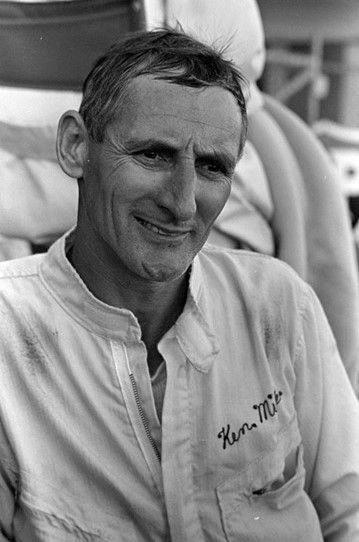In the annals of motorsport history, few names resonate with the same level of reverence as Ken Miles. A brilliant driver and a masterful engineer, Miles played a pivotal role in one of the most iconic automotive rivalries of the 20th century. At the heart of this saga lies the Ford GT40, a car that not only redefined endurance racing but also marked a bold statement in Ford’s ambition to conquer Le Mans and dethrone Ferrari’s long-standing dominance. This article delves into the captivating journey of Ken Miles and the GT40, exploring the unparalleled ingenuity behind the vehicle, the relentless pursuit of speed, and the bittersweet tale of a man whose legacy continues to inspire enthusiasts and racers alike today. Join us as we navigate the twists and turns of history, ingenuity, and the indomitable spirit of competition that define both Ken Miles and the extraordinary GT40.
Table of Contents
- The Legacy of Ken Miles and the GT40 in Racing History
- Engineering Excellence: The Design and Performance of the GT40
- Ken Miles Unyielding Spirit and its Impact on Motorsports
- Lessons from the GT40: Innovations that Shaped Future Race Cars
- Q&A
- Key Takeaways
The Legacy of Ken Miles and the GT40 in Racing History
The story of Ken Miles and the Ford GT40 is a remarkable chapter in the annals of motorsport history. Ken Miles, a talented British-American racing driver and engineer, became synonymous with the GT40, a car that was engineered to challenge Ferrari’s dominance at the prestigious Le Mans race. His exceptional skill and relentless pursuit of perfection significantly contributed to the GT40’s triumphs on the track, particularly during the 1966 24 Hours of Le Mans. Miles didn’t just drive; he was integral in refining the car’s performance, making critical adjustments that would ultimately secure Ford’s place in racing folklore.
Through a combination of talent, innovation, and a touch of audacity, Miles helped to create an enduring legacy that fuels racing passion today. The GT40, with its sleek design and powerful engine, remains a symbol of American engineering prowess and racing spirit. Its success on the track inspired a generation of racers and car enthusiasts alike. Some of the key highlights of this legacy include:
- Unmatched Performance: The GT40 secured four consecutive victories at Le Mans from 1966 to 1969.
- Heritage of Innovation: The car featured groundbreaking technology that set new standards in the automotive world.
- Cultural Impact: The GT40 transcended racing, becoming a staple in popular culture from films to memorabilia.
Engineering Excellence: The Design and Performance of the GT40
The Ford GT40 stands as a remarkable testament to innovation in automotive engineering, capturing the hearts of enthusiasts and legends alike. Underpinning its iconic shape is a meticulously crafted chassis designed for optimal aerodynamics and structural integrity. Key features of the GT40’s design include:
- Mid-engine layout: Positioned for better weight distribution and handling.
- Aluminum body panels: Lightweight yet sturdy, enhancing performance without compromising safety.
- Race-ready suspension: Advanced setups gleaned from motorsport experience, ensuring stability at high speeds.
When it comes to performance, the GT40 doesn’t merely meet expectations; it shatters them. Generating formidable horsepower, this machine was engineered for endurance, speed, and victory on the racetrack. Its specifications reveal a powerhouse designed to conquer challenges:
| Feature | Specification |
|---|---|
| Engine: | Ford 289 V8 |
| Power: | 420 hp |
| Top Speed: | 200 mph |
| Weight: | 2,250 lbs |
Ken Miles Unyielding Spirit and its Impact on Motorsports
Ken Miles was not just a name in the annals of motorsports; he embodied an unyielding spirit that reshaped the racing landscape. His relentless pursuit of perfection and innovative thinking played a crucial role in the development of the Ford GT40, transforming it from a dream into a dominant force on the track. A master of engineering and driving, Miles’ commitment to pushing limits resulted in groundbreaking advances in aerodynamics and handling, making the GT40 an emblem of speed and endurance. Among his significant contributions were:
- Revolutionary Testing Techniques: Miles utilized rigorous testing protocols to refine the vehicle’s performance.
- Collaborative Innovations: He partnered with engineers to implement cutting-edge designs that would enhance speed.
- Strategic Race Management: His tactical knowledge allowed for timely decisions during races, maximizing the GT40’s potential.
The legacy of Ken Miles resonates in every corner of motorsports today, inspiring a new generation of drivers and engineers to embrace challenge and creativity. His drive didn’t just fuel victories, but also sparked a transformation that established a new benchmark in racing culture. The following table highlights key aspects of Miles’ influence:
| Aspect | Impact |
|---|---|
| Driving Expertise | Set new standards for precision driving in competitive racing |
| Engineering Insight | Fostered collaborations that led to innovative automotive advancements |
| Circuit Strategy | Influenced race tactics that many teams implement today |
Lessons from the GT40: Innovations that Shaped Future Race Cars
The Ford GT40 stands as a monumental benchmark in automotive history, not just for its performance, but for its pioneering innovations that set the stage for the future of race cars. Engineers infused the GT40 with an agile yet robust chassis, allowing for remarkable handling and stability at high speeds. Key innovations included:
- Lightweight aluminum and fiberglass body: This combination reduced weight while maintaining strength, a principle that continues to be critical in car design today.
- Mid-engine layout: The GT40’s design improved weight distribution and handling, a concept that has influenced countless supercars and race vehicles.
- Aerodynamic refinement: The sleek profile minimized drag and increased downforce, highlighting the importance of aerodynamics in contemporary race car engineering.
Moreover, the GT40’s introduction of advanced technology expanded the possibilities for race cars in terms of speed and efficiency. Its use of cutting-edge materials and performance-engineered components laid the groundwork for the integration of technology into racing. Consider the following table that outlines advancements introduced with the GT40:
| Innovation | Impact on Future Designs |
|---|---|
| Independent suspension | Enhanced traction and ride quality |
| Disc brakes | Improved stopping power and control |
| Fuel injection systems | Better fuel efficiency and performance |
This legacy of innovation resonated beyond the GT40’s era, pushing car manufacturers to explore new horizons in race car design. The GT40 remains a quintessential example of how performance and engineering converge, leading to breakthroughs that continue to drive the evolution of motorsport.
Q&A
Q&A: The Legend of Ken Miles and the GT40
Q: Who was Ken Miles, and why is he significant in automotive history?
A: Ken Miles was a British sports car racing driver and engineer, renowned for his remarkable feats in the 1960s. His legacy is closely linked to the Ford GT40, a high-performance racing car developed to challenge Ferrari at the 24 Hours of Le Mans. Miles was not only a skilled driver but also integral in the development of the GT40, contributing his engineering insights that helped refine its performance on the track.
Q: What made the Ford GT40 unique in racing during its time?
A: The Ford GT40 stood out for several reasons, primarily its aerodynamics and powertrain. Its low-slung design minimized drag, while the powerful V8 engine enabled it to reach impressive speeds. The GT40’s engineering was revolutionary, incorporating advanced technology that allowed it to compete effectively against European rivals. This combination of innovation and performance made it a formidable contender in endurance racing.
Q: Can you explain Ken Miles’ role in the development of the GT40?
A: Ken Miles was instrumental in the GT40’s evolution, acting as both a test driver and a development consultant. His feedback and experience on the track helped engineers tweak the car’s handling, stability, and overall performance. His deep understanding of racing dynamics allowed him to push the boundaries of the GT40’s capabilities, undoubtedly making it a better car come race day.
Q: What were some of Ken Miles’ notable achievements with the GT40?
A: Miles achieved numerous accolades during his time with the GT40, perhaps most famously his dominant performance at the 1966 24 Hours of Le Mans. His team, driving a GT40 MK II, led the race, and despite a controversial finish, many believe Miles had the capacity to win outright. In addition, his victories at other prestigious races solidified his reputation as one of the era’s top drivers.
Q: Why is the 1966 Le Mans finish significant in Ken Miles’ story?
A: The 1966 Le Mans finish is a pivotal moment in racing history not just for Ken Miles, but for Ford and motorsport as a whole. Miles was leading the race, but due to a decision made by Ford executives to stage a dramatic finish, the lead drivers slowed down to create a photo finish. This resulted in Miles being classified as second, despite him having crossed the finish line in first place. This controversial outcome has been a point of discussion for decades, often overshadowing Miles’ undeniable talent and contributions.
Q: How is Ken Miles remembered today?
A: Ken Miles is celebrated as a racing legend and is particularly revered in automotive circles. His contributions to the Ford GT40 are often highlighted in documentaries, books, and films, such as “Ford v Ferrari,” which brought renewed attention to his legacy. Miles represents the spirit of innovation and determination in motorsport, serving as an inspiration for aspiring engineers and drivers alike.
Q: What is Ken Miles’ legacy, and how does it influence motorsport today?
A: Ken Miles’ legacy endures through the continued admiration for the GT40 and its storied history in racing. His story showcases the intersection of engineering prowess and racing skill, inspiring a new generation of automotive enthusiasts. The emphasis on teamwork, innovation, and relentless pursuit of performance remains a guiding principle in modern motorsport, ensuring that Miles’ influence is felt far beyond his time.
Key Takeaways
As we draw the curtain on the remarkable tale of Ken Miles and the GT40, we are reminded that history is often forged in the crucible of passion, engineering brilliance, and the indomitable human spirit. Miles didn’t just race a car; he became a vital thread in the tapestry of motorsport, an artist wielding gears and gasoline to craft moments of sheer exhilaration on the racetrack.
The legacy of the GT40, from its innovative design to its storied victories, stands as a tribute not only to the visionaries who engineered it but also to the tenacity of a man who dared to push boundaries. While Ken Miles may no longer be with us, his spirit revives every time a GT40 roars to life, echoing his unwavering pursuit of speed and excellence.
In a world where legends fade and technology relentlessly evolves, the saga of Ken Miles and the GT40 remains a stirring reminder that true greatness is often defined not just by what we achieve, but by the stories we leave behind. So, whether you’re a motorsport aficionado or a casual enthusiast, let us celebrate not just the feats of the past, but the passion and perseverance that continue to inspire future generations of dreamers and engineers on the raceway of life.


